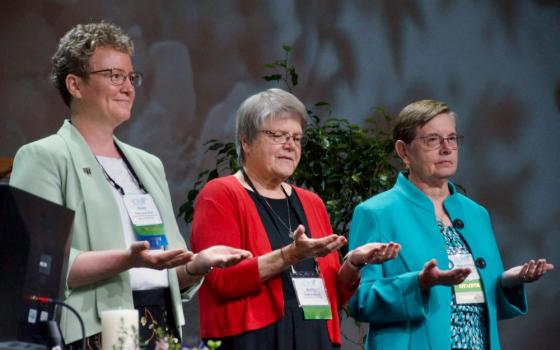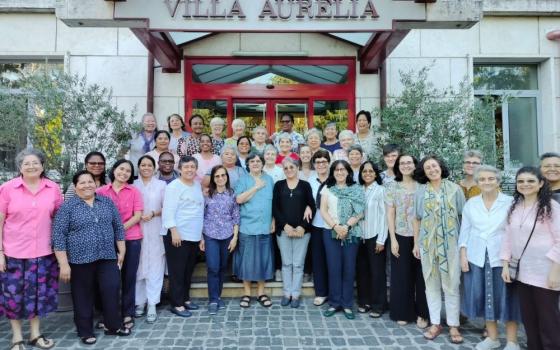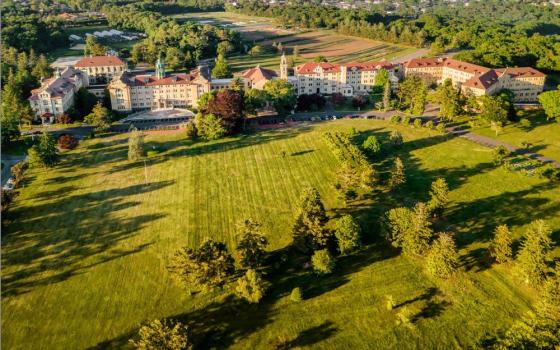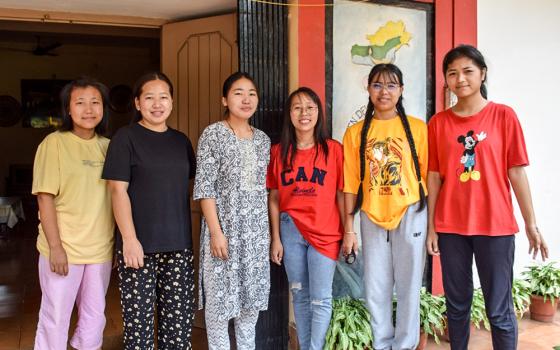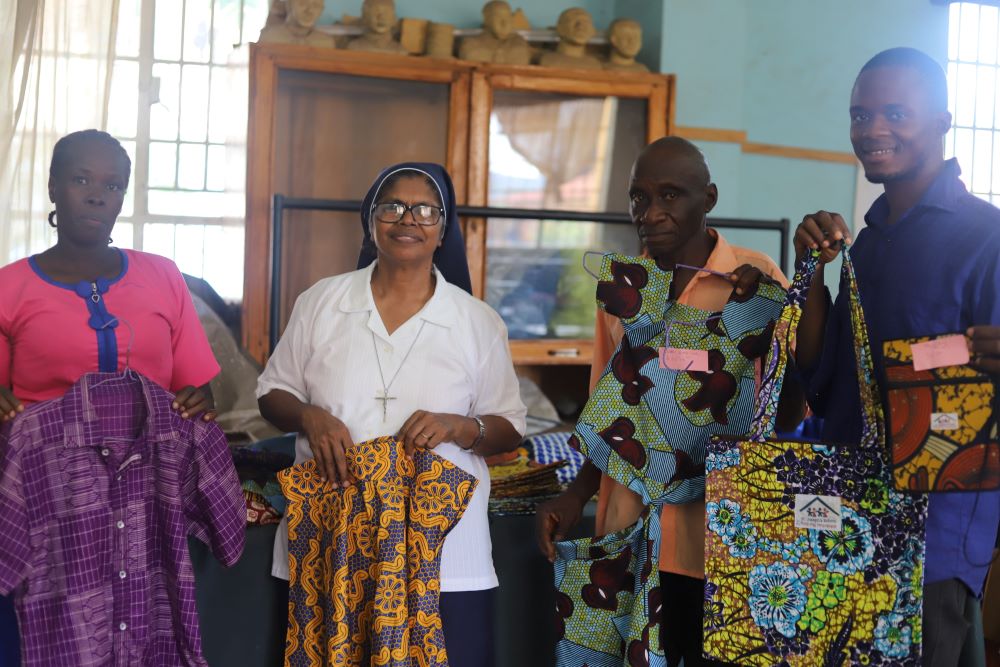
Sr. Amala Ranee Santiago is pictured with some of the beneficiaries at St. Joseph's School for the Hearing Impaired in Makeni, Sierra Leone. The school offers deaf and hard of hearing children a chance at education by training them in tailoring, catering, plumbing, hairdressing and other vocational fields. (GSR photo/Doreen Ajiambo)
For years, Sr. Amala Ranee Santiago, a member of the Sisters of St. Joseph of Cluny, has been using her career as a teacher to give deaf and hard of hearing children a chance at education. She helps them reach their full academic potential by providing the necessary support and environment through running of St. Joseph's School for the Hearing Impaired in Makeni, a town in the northern part of the country.
Santiago has been the St. Joseph's School administrator since 2009. The nun said at first she had no skill in sign language. Still, her passion for deaf and hard of hearing children drove her to take over the responsibilities of the school, which was established in 1979.
St. Joseph's School for the Hearing Impaired is the only educational institution in the West African nation of 9 million people that offers assessment and testing for deaf and hard of hearing children.
Sierra Leona is a poor nation on the west coast of Africa just north of Liberia. A 2015 study found 9.1% of children in Sierra Leone lived with mild or greater hearing loss. The prevalence of bilateral profound hearing loss was 4 per 1,000, the report said.
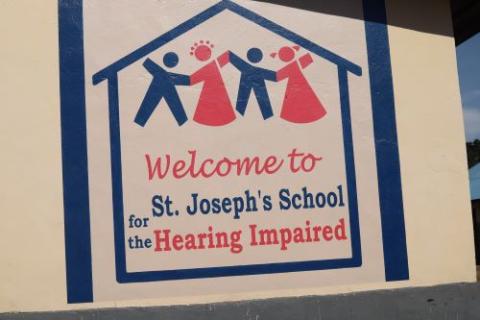
St. Joseph's School for the Hearing Impaired in Makeni, Sierra Leone, is the country's only school offering hearing aid assessment and testing. (GSR photo/Doreen Ajiambo)
Santiago said that many children at the institution have been rejected by their families and community. The nun said hard of hearing people in the country are oppressed, and many face challenges such as stigma, prejudice, low self-esteem, barriers to curricular access and lack of teacher competence.
"I came here as a teacher without any skills in sign language because I have always been passionate about deaf children; therefore, this job best suited my dream, passion and Christian mission," Santiago said, noting that she learned sign language alongside deaf children at the institution. "I believe that all children have the equal right to education and a chance to achieve their dreams despite how they are born because we don’t choose how to be born."
Santiago said the institution, which currently has more than 250 students, admits all deaf and hard of hearing children regardless of religion. She said the school offers hope for many children to thrive academically, socially and emotionally in the community, which does not consider them worth educating.
"In an African setting, many children born with a disability are always completely forgotten, especially when it comes to fulfilling their dreams," she said.
Santiago said the school runs on donations from the church and well-wishers. She said the school offers hands-on skills, including dressmaking, hairdressing and cooking. They also teach sign language and lip reading to enable the children to communicate.
"Through the lessons we offer, we want these children to understand what someone is saying even if they don't hear. We want our children here to fit into society and not feel isolated," Santiago said. "The life skills we offer help them be independent people in the future and live normal lives."
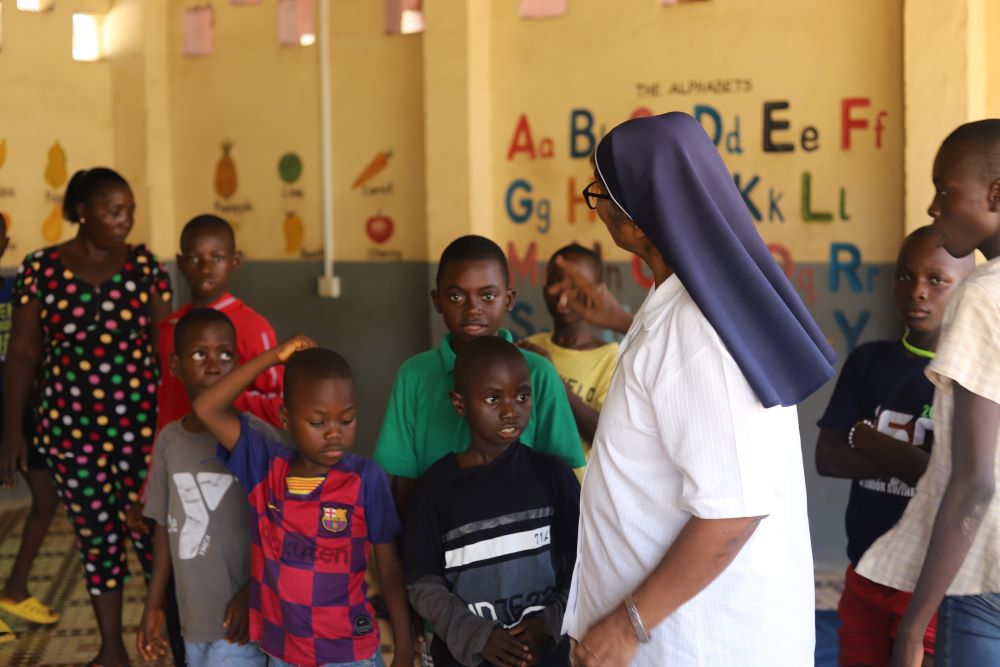
Sr. Amala Ranee Santiago interacts with children at St Joseph's School for the Hearing Impaired in Makeni, a town in northern Sierra Leone, on Sept. 15. (GSR photo/Doreen Ajiambo)
GSR: What is the right age and qualifications for a child to join this school?
Santiago: We take in children who are either completely or partially deaf. We prefer to take in children below 10 because it is easy for them to learn sign language. A child below 10 can be easily assessed by teachers and put in the appropriate class. Teachers can change the situation for younger children by giving them a hearing aid. Learning sign language for young children becomes very easy, but for older ones, it takes work to learn.
What has changed since you took over?
Before I came here, the school did not conduct any national exams. We had to send the children to other schools for national exams, but now we conduct them here. After the high school national exams, children were not proceeding further. But after I took over, I worked hard to ensure that children also received tertiary education, like going to colleges and universities for those who did well on exams and sending others to vocational schools.
When I came here, the children were taught the normal school curriculum, and because of this, they didn’t progress above high school. Their performance was always abysmal, but since I took over, I have been able to send some of my children to university. One of our children is now a clinical officer helping us here. The children here can also go to places like markets, communicate and buy things without assistance. I consider this a success.
Why the hard of hearing?
Our founder had a passion for working with children with disabilities. When she started this school, she took in all the children who had all forms of disability, but as time went by, she realized that the highest number was the [deaf and hard of hearing]. People in this country are very superstitious, so when you get a child who is deaf, people consider them to be a curse because they claim that deafness is a curse from their gods. Society does not accept such children; therefore, they are left to suffer or die. However, here at St. Joseph's School, we teach them skills and assure them that even if they don't hear, they can do other things just like other people.
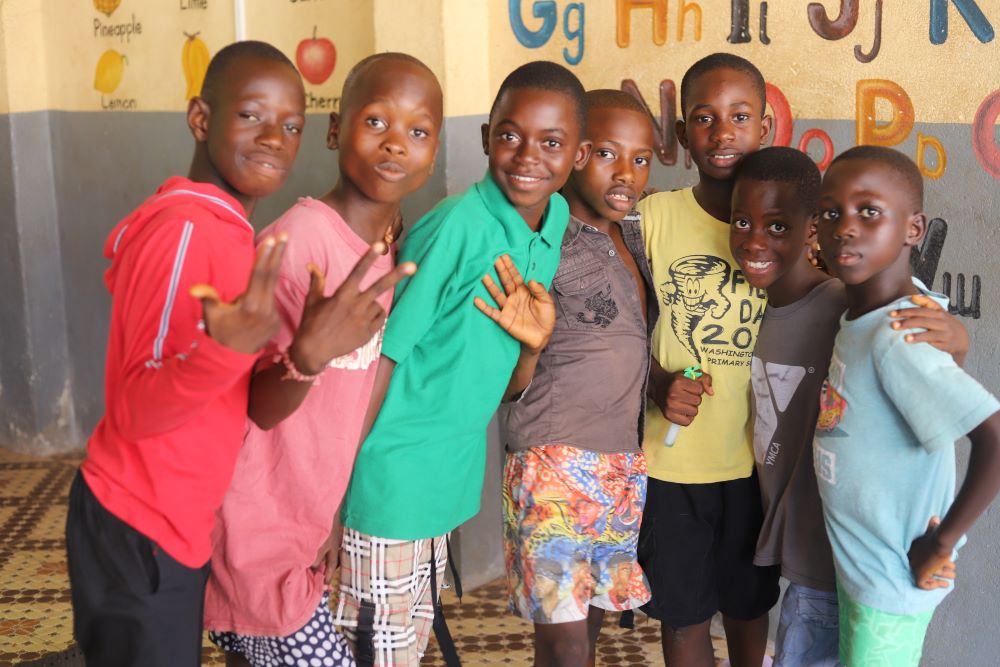
More than 250 children attend St. Joseph's School for the Hearing Impaired in Makeni, Sierra Leone. Here several children are pictured on Sept. 15. (GSR photo/Doreen Ajiambo)
What are some of your challenges while running this institution?
Lack of finance is the biggest problem that I go through here. We have to feed the children and take care of them, and we also have to pay the staff. This school is more of a charity because those who can pay school fees pay very little, and those who can't study for free. When we take our children to higher institutions like universities or colleges, they ask for a lot of money, which we don't have.
Most of the children here are abandoned. Their parents come and abandon them without even essential toiletries, and they never return. So basically, you take them in whether you like it or not. We are always begging the government or well-wishers to help us, but not much help is coming. The government should at least help us so that we push our children further, but we have to depend on ourselves.
Therefore, to keep these children in the institution, I am forced to buy their books myself. I also have to pay for medical bills when I take these children to the hospital.
Advertisement
How do you juggle your various responsibilities?
It is challenging, but I have people to help me. Being an administrator, I send people to do the assignments I can't do, especially when I'm not there. However, the decision-making solely depends on me. There was a time when I had to study for my master's and run the school. It was hard. I did not sleep the whole week because I was at this institution during the weekdays and in college on weekends. This put a strain on me. The support from my congregation makes it easier for me to run the school. They always come in whenever I feel stuck.
How does the Holy Spirit work in your ministry?
Every day, I wake up and surrender to God to lead me. I tell God, "I'm nothing, and you are the only one who can lead me."
Without God, I will not make it. I dedicate each day to God to guide my steps because I know that there are people who need me, and I need him so that I can serve them to the best of my ability. You need patience and the guidance of the Holy Spirit to get through. It is not easy, but when you look at their humanity, these children are like any other children, and they are even wiser and need care and love just like everybody else. Whenever I see their smiles, it gives me the courage to continue serving them despite the challenges because that is what God wants us to do.

